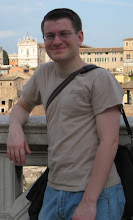 As I write about schools in Rome, I cannot overlook the school that I am attending. Penn State's presence in Rome in its current form, the Sede di Roma, is a little over two decades old, but the Communication Arts & Sciences Program is only three years old. The curriculum is comprised of three classes: one on travel writing, one on neo-realist film, and one called "Street and Studio" which require the students to blog about their experiences in Rome. The students are also required to keep a journal that records their experiences in Rome including their reactions to the films and readings. As a graduate student, I do all of the work that the undergraduates do in order to provide a model for them and I grade six of their journals on a weekly basis.
As I write about schools in Rome, I cannot overlook the school that I am attending. Penn State's presence in Rome in its current form, the Sede di Roma, is a little over two decades old, but the Communication Arts & Sciences Program is only three years old. The curriculum is comprised of three classes: one on travel writing, one on neo-realist film, and one called "Street and Studio" which require the students to blog about their experiences in Rome. The students are also required to keep a journal that records their experiences in Rome including their reactions to the films and readings. As a graduate student, I do all of the work that the undergraduates do in order to provide a model for them and I grade six of their journals on a weekly basis.One of the overarching goals of the program is to teach the students to rhetorically analyze tourism and travel writing. The students are encouraged to take Rome as a text, identify themes that the city displays, and analyze those themes in search of greater understanding. The hope is that the students will improve their experience of Rome if they investigate it as a purposeful human production. That is, if they view Rome itself as an act of communication, they may be able to identify the communicative manipulations that have gone into its construction. At the same time, the students are encouraged to examine writing about Rome as rhetorical. In this case, they are asked to look into the ways in which Rome is represented at home and abroad and ask how these reproductions have influenced their expectations for and experience of the city. Ultimately, through this process of rhetorical examination, the students are encouraged to engage in an enlightened form of tourism that results in meaningful learning about place and not merely the consumption of it.
 As a graduate student, I fit somewhere in the middle of this educational process. I am here both to learn about Rome itself and to learn about teaching in a study abroad program. For me, the extra layer of analysis is primarily pedagogical and this is enhanced by research interests in education. I am learning about Rome and, at the same time, learning how to teach about Rome through rhetoric's disciplinary lens. This requires quite a bit of attention to detail. It is difficult to take in new information and at the same time analyze the pedagogical purpose behind its deployment, but this nervous process of double-think is excellent practice for any scholar of rhetoric. Meaningful rhetorical analysis almost always requires the scholar to be attuned both to the object of rhetorical action (that is, the subject matter that is being communicated) and the strategic nature of its deployment (its rhetoric) at the same time. In this way, I think this experience will help me to develop both as an educator and as a scholar.
As a graduate student, I fit somewhere in the middle of this educational process. I am here both to learn about Rome itself and to learn about teaching in a study abroad program. For me, the extra layer of analysis is primarily pedagogical and this is enhanced by research interests in education. I am learning about Rome and, at the same time, learning how to teach about Rome through rhetoric's disciplinary lens. This requires quite a bit of attention to detail. It is difficult to take in new information and at the same time analyze the pedagogical purpose behind its deployment, but this nervous process of double-think is excellent practice for any scholar of rhetoric. Meaningful rhetorical analysis almost always requires the scholar to be attuned both to the object of rhetorical action (that is, the subject matter that is being communicated) and the strategic nature of its deployment (its rhetoric) at the same time. In this way, I think this experience will help me to develop both as an educator and as a scholar.The second picture (with Mia, Jessica, and myself on the bus) was taken and edited by Hillary.



No comments:
Post a Comment